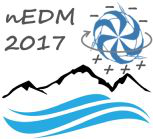Speaker
Steve Sidhu
(TRIUMF, SFU)
Description
The newly installed vertical source at TRIUMF will enable the production of
neutrons with energies below 300~neV, referred to as ultracold neutrons (UCN).
A superfluid helium cryostat uses three cooling stages and a heat exchanger to
produce isopure He-II at <1K. Fast neutrons are produced through spallation
of a tungsten target by a proton beam from the TRIUMF 520~MeV cyclotron.
These neutrons are cooled down through a series of moderators: first to 300~K
in liquid D2O, then to < 80~K in ice D2O, and finally to the ultracold regime
in the He-II bulk within the cryostat. Neutrons in this temperature range can
be confined by strong interactions with high Fermi potential materials, allowing
them to be directed and stored. The ability to confine UCN makes them useful
for exploring fundamental neutron physics. In particular, the UCN produced
at TRIUMF will be used to probe the upper limit of the neutron electric dipole
moment (nEDM), currently bound as $|d_n| < 3 × 10^{−26}e$cm. The existence
of the nEDM is a violation of CP-symmetry, and the magnitude of the nEDM
provides insight into CP violating processes.
| ssidhu@triumf.ca |
Primary authors
Beryl Bell
(TRIUMF)
Sean Vanbergen
(UBC)
Co-author
Steve Sidhu
(TRIUMF, SFU)

